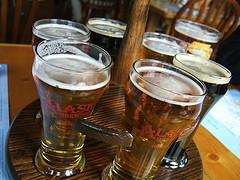
For the beer lover whos really serious about their suds, there are few things more exciting than getting into the hobby of home brewing. One of the questions every beginning and would be home brewer wants the answer to when they first pick up a beer brewing kit is this: how long is it going to take to go from getting your ingredients prepared to finally uncapping a bottle of your first home brewed beer?
Its hard not to look forward to opening that first bottle of your own homemade beer; but of course, its not quite as simple as all that. While, it is indeed easy to make your own beer using the kits available at your local home brew and wine making shop, there is of course some patience required (as in, youll probably end up paying for some beer from your local liquor store before your home brew is ready to drink). Like anything truly great though, your first batch of homemade beer is one of those things that is well worth waiting for.
From Brewing to Drinking
The time it takes for your beer to go from raw materials to finished, ready to drink beer depends on a number of different factors. Generally, the process takes between four and eight weeks (one to two months). Four weeks is pretty much the least amount of time youll have to wait.
The actual process of preparing the ingredients takes only a few hours, but your beer-to-be will need to ferment in your beer brewing kit for at least two weeks (or longer, depending on the type of beer youre brewing), followed by two weeks of bottle conditioning after youve bottled your home brew.
The temperature and the quality of the yeast youre using to prepare your home brew will also have an impact on the amount of time your beer will take to ferment. While you shouldnt have to worry about the integrity of your ingredients when you use a beer brewing kit and ready to use packaged ingredients, its important to remember that brewing is both an art and a science. Your beer will be ready when its ready and no sooner patience is all part of being a home brewer. Once youve bottled your first batch, you can always start on the next one so that youre always stocked with a supply of great tasting home brewed beer. This will make waiting for the next batch to be finished a little easier to bear.
First Things First: Sanitize Your Equipment
There is one very important thing you need to do first even assuming that you have an all in one kit which includes all of the beer brewing ingredients you need to get your first brew going. Before you do anything else, you need to thoroughly wash and sanitize all of your brewing equipment. It may be brand new, but even the smallest amount of contamination can mean ruined beer and thats the last thing you want to happen with your very first foray into the exciting world of home brewing.
Beer Fermentation
After preparing your ingredients for brewing (which will only take an hour or two), it goes into your fermentation vessel, where it will be very active for the next couple of days, followed by another ten days or so of slower fermentation. Total fermentation time is about two weeks, so factor this into the total wait.
After your beer has completed its first fermentation, youll need to bottle your brew after adding priming sugar (or if you want to save a little time and trouble, carbonation tablets). Once the bottles are capped, youll need to store them somewhere dark at room temperature for at least two weeks and perhaps as long as a month for bottle conditioning. During this time, a small amount of secondary fermentation occurs as the remaining yeast in your brew converts the sugars from your priming sugar into carbon dioxide; if you dont wait long enough during this step, you could end up with flat beer.
Ales vs. Lagers
Different styles of beer may take slightly more or less time to ferment and do better with longer or shorter periods of bottle conditioning. For instance, ales generally do not take more than two weeks to be ready to drink after leaving your beer brewing kit for bottles. Lagers do best with four to six weeks of conditioning after being bottled.
If you simply cant wait, its OK to try them after two weeks, but many beers do benefit from a longer conditioning. Admittedly, home brewing does include a lot of waiting, but once you take your first sip, youll agree that it was worth it. Once you taste your handiwork, youll no doubt want to start on your next batch right away so that youll never be without fresh, home brewed beer ever again.
If you want to stay on top of Quality Wine & Ale Supply's newest content, then:


 For the beer lover whos really serious about their suds, there are few things more exciting than getting into the hobby of home brewing. One of the questions every beginning and would be home brewer wants the answer to when they first pick up a beer brewing kit is this: how long is it going to take to go from getting your ingredients prepared to finally uncapping a bottle of your first home brewed beer?
Its hard not to look forward to opening that first bottle of your own homemade beer; but of course, its not quite as simple as all that. While, it is indeed easy to make your own beer using the kits available at your local home brew and wine making shop, there is of course some patience required (as in, youll probably end up paying for some beer from your local liquor store before your home brew is ready to drink). Like anything truly great though, your first batch of homemade beer is one of those things that is well worth waiting for.
For the beer lover whos really serious about their suds, there are few things more exciting than getting into the hobby of home brewing. One of the questions every beginning and would be home brewer wants the answer to when they first pick up a beer brewing kit is this: how long is it going to take to go from getting your ingredients prepared to finally uncapping a bottle of your first home brewed beer?
Its hard not to look forward to opening that first bottle of your own homemade beer; but of course, its not quite as simple as all that. While, it is indeed easy to make your own beer using the kits available at your local home brew and wine making shop, there is of course some patience required (as in, youll probably end up paying for some beer from your local liquor store before your home brew is ready to drink). Like anything truly great though, your first batch of homemade beer is one of those things that is well worth waiting for.

